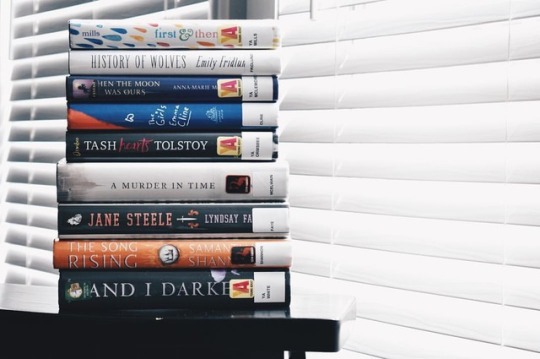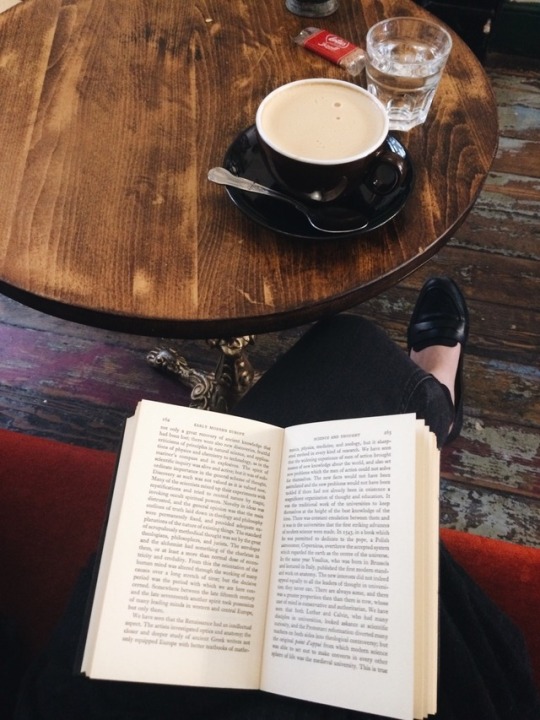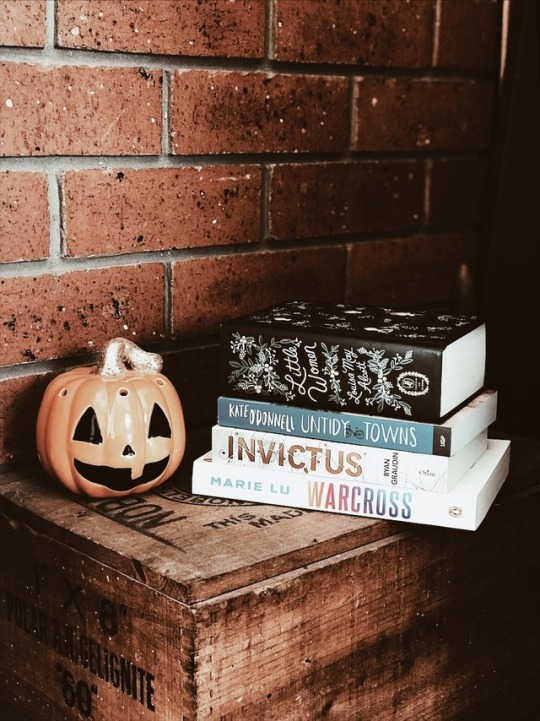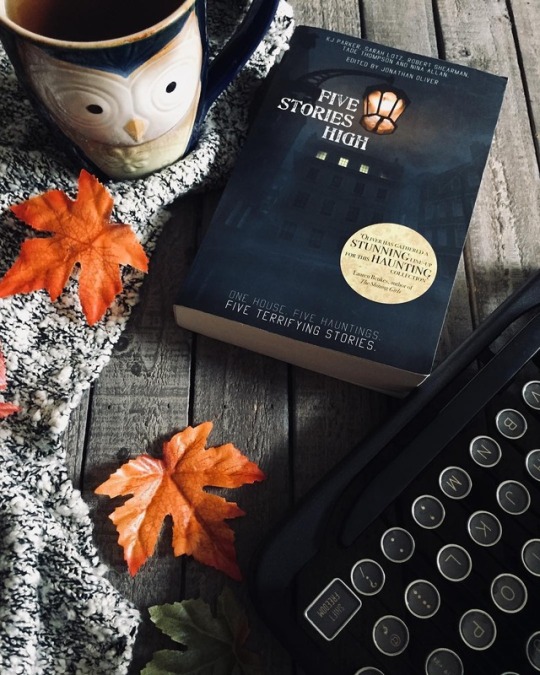Text
hey guys!
sorry i haven’t been online lately! ive been busy at work and with other life responsibilities. i should be free for the next couple days, so i’m hoping to be online more tomorrow! i’ll make sure to respond to my dms then, too! sorry again for disappearing for a few days 😖
#thank you to all my new followers!#i’ll go through the notes on my one post again when i come online tomorrow#i’m going to bed as soon as i go home#it’s past midnight lmao#ayana talks
13 notes
·
View notes
Photo

a library haul for you lovely people ⭐️
371 notes
·
View notes
Text
Character Mannerisms
Here’s some considerations for the tiny little details that can add a lot to a character. Figuring out these mannerisms can do a lot for conveying character traits through their normal actions rather than just their thoughts, dialogue, etc.
How’s their posture? There are more options than just sitting up straight or slouching a lot. What’s their most comfortable sitting position? Do they have a consistent posture or does it change depending on situation / present company?
How’s their etiquette? Do they hold the door for people behind them? How do they handle handshakes and other kinds of typical contact? Does their language change or become more formal when speaking to strangers? To their elders? To their superiors?
In a crowded space, do they get out of people’s way, or do people get out of THEIR way?
How do they point something out? Pointing their finger? Nodding their head? A flippant wave of the hand?
What are their comfort gestures or self-touch gestures? Common comfort gestures include rubbing the back of the neck or gripping their own arms. Can they suppress these gestures or do they do them often?
Also consider the character’s common reactions to common emotions. Do they whoop when they’re excited? Do they tremble when angry?
What parts of the body are the most expressive? Do they shuffle and stomp their feet a lot when agitated or excited? Are they a hand talker? Do they have an impressive range of motion with their eyebrows?
How do they sound? Do their car keys jingle as they walk? Do they drag their feet? Do their heels clack resoundingly on hard floors? Do they breathe loudly? Do they fidget in ways that make a lot of noise?
How do they handle eye contact?
Any behaviors they reserve for moments when they’re alone? (Or possibly among family/friends that don’t care?) Do they pick their nose? Do they bite their toenails? Do they sniff their armpits? Or do they not care if people see behavior like this?
Apart from comfort gestures, what else do they do to comfort themselves in trying times? What’s their go-to self care? What’s their comfort food? Where’s their safe space?
What are they doing with themselves as they’re suppressing emotion? Lip biting, fist clenching, and avoiding eye contact are common methods of coping with strong emotions.
36K notes
·
View notes
Text
Me, every day of my life: “Phew, totally ready for my lazy day of reading!”
161 notes
·
View notes
Text
NaNo Overview Week Outlining Resources
And on the sixth day of overview week, we have…outlining!
Naming your Story
How Do I Choose a Title? From @theticklishpear
Coming Up With Titles from @clevergirlhelps
Novel Titling Tips from @writinghelpers
How to Title Your Novel
Tips for Chapter Titles
Novel Planning
CJ’s Novel Planning Guide from @cjcogan
Novel Planning from @theticklishpear
Novel Plotting Worksheets
Transform Raw Inspiration into a Novel Plan
NaNo Prep: How to Make A Timeline from @nanowrimo
Outlining Methods
The 10-Point Plot Model from @theticklishpear
The Snowflake Method for Designing a Novel
How to Create a Special Snowflake (No, Really! Creating Fiction Through the Snowflake Method) from @plotlinehotline
The Plot Maker via @amandaonwriting
The POOCH Method
The Hero’s Journey
The Try/Fail Cycle
Question-Based Steps to Story Structure
Making Your Murder Board (or, Creating Fiction Through the Mind Map Method) from @plotlinehotline
Creating plots with the zigzag method from @1000storyideas
Lock Plot System from @fuckyeahcharacterdevelopment
10 Outline Techniques for Writers from @1000storyideas
Creating Your Own Story Structures from @oliviapaigewrites
The Strength of a Symmetrical Plot (Ring/Chiastic Structure) from @letswritesomenovels
A Few Different Ways to Sketch Out A Plot
Create an Awesome Plot Outline
How I Plot a Novel in 5 Steps
The Madwoman’s Outlining Technique
Pantser Outlining Methods
How to Plot Even If You’re A Pantser
How A Pantser Outlines
DIY MFA: Mapping Out Your Story
DIY MFA: Unconventional Outlining Techniques
Chuck Wendig: Humorous Plot Outline (Warning: Crass)
877 notes
·
View notes
Photo


Early Modern Europe and (very milky) soy coffee
15K notes
·
View notes
Note
I never manage to finish a writing idea, because I'm always on different ideas. Even if I try and force myself to stick to it, it turns out terrible because I no longer like or feel inspired by the idea. This is really constricting me from finishing anything. Any advice? (By the way, your blog is a great source of help for me, thank you!!)
I’m glad you find me to be helpful!
This is the kind of issue where you need to figure out what’s causing your inspiration to wane. I can throw motivation ideas at you all night, but that’s not going to help if you can’t find the root of the issue. (I actually have a post coming this Sunday the 8th that covers getting re-motivated, so you might want to check that out when it goes live, and once you read the rest of my advice.)
Here are a some questions you could ask yourself to possibly figure out that cause of your disinterest:
- When do you lose interest? The start? The middle? There might be a specific point that’s giving you trouble and if you can hone in on it, it could be fixable.
- Is it a gradual loss, or more sudden? Which scene do you realize you want to give up on the idea?
- What seems enticing about the new ideas? Is it a new character perspective, or perhaps a cooler plot? It’s common to want to ‘move on’ when a current project isn’t adhering to your personal desire for a ‘good story’.
- What kind of stories do you like to read? Or watch? If you can stick with media, there’s a chance that those kind of stories can keep your interest as a project.
- Do you lose interest because things don’t turn out the way you like? It’s common for newer writers to get discouraged (hidden inside waning motivation) when their work isn’t at a level that is interesting to read. Or they can’t write the scenes they want because they don’t know how.
- Are your ideas ‘playing it safe’? That idea for a scene where someone relaxes in front of a fire can be really rewarding in an otherwise intense story, so it’s common to want to replicate those kind of relaxed or ‘calm/safe’ moods. The trouble comes when you don’t have the intensity to make that scene feel worth it, and suddenly things get boring and you want to move on.
- Have you tried planning? Sometimes that helps people see the potential excitement in their story and can give them something to look forward to.
Those are just some examples of questions, but the point is to get you analyzing your writing and ideas to figure out why you have this issue. The cause is different for everyone, so I can’t guess what yours is, but once you know it then I can help you fix it.
I hope that set you on the right track, and good luck figuring out what’s happening to your inspiration!
#writing tips#motivation#this is an awesome post and it’s especially applicable to me#i lost interest in everything i do ever#(besides horn and ivory so far and that’s incredible in and of itself)#lose interest*
65 notes
·
View notes
Photo

level of clutteredness: biennial bookshelves cleaning
2K notes
·
View notes
Text
The difference between Critique Partners and Beta Readers:
Critique Partners:
Say: “These are all the things that subtract from the story you’re trying to tell and these are the ways I recommend fixing them if you want to reach your intended outcome.”
Must: Understand your personal writing style and your vision for the book, be at a similar writing skill level as you, and be able to communicate well with you in a constructive back and forth dialogue.
You should have: About 3 at any given time, though the number will vary though your writing career.
Your responsibilities: To respect their advice and give them the thorough, honest critique on their manuscripts in return.
Beta Readers:
Say: “This is what I understood while reading, this is why I came to that understanding, and this is what I think of it and how it made me feel.”
Must: Be a reader in (or near) the manuscript’s target audience, have the ability and desire to think deeply about a piece of writing, and convey those thoughts in a way that the author can make sense of.
You should have: 7-15 at the end of any given beta reading round. (The longer the story, the more likely it is that beta readers will drop out due to time constraints, personal life problems, or sheer forgetfulness.)
Your responsibilities: To keep track of their progress and encourage them to continue reading, to look for patterns or contradictions in their responses and decide what needs to be changed in order to receive the reactions you want from the majority of your readers in the future, and to ignore any advice you don’t firmly believe will make your book better.
Find out more about Beta Readers and Critique Partners!
3K notes
·
View notes
Text
*me, to my own mind* can u like s h u t the fuck up for once
128K notes
·
View notes
Photo

Table of Contents:
Part One: A New Standard
Part Two: Types of Parents
Part Three: Parents in Literature
Part Four: Parents on the Page
Part Five: Sibling Scenarios
Part Six: Sibling Perception
Part Seven: Writing Siblings
A Diversion: Myths About Writing Close Sibling Relationships
A Diversion: Siblings With Age Differences
A Diversion: Writing Twins
Part Eight: Knowing the Outer Family
Part Nine: Piblings :: The Cool Extended Parents
Part Ten: Qualifying Cousins
Part Eleven: Cousin Appearances
Part Twelve: Writing Cousins
Part Thirteen: The Roots of Friendship
Part Fourteen: The Definition of Friend
Part Fifteen: Layers of Friendship
Part Sixteen: Writing the Best Friend
Part Seventeen: Surely Antagonistic
Part Eighteen: Evil Manifests as Villain
Part Nineteen: Protagonist in the Way
Part Twenty: Conversations with Antagonists
Part Twenty-One: Deepened Friendship
Part Twenty-Two: Influences of Individual History
Part Twenty-Three: Crafting Dates
Part Twenty-Four: Expectations
Part Twenty-Five: Healthy Relationships
Part Twenty-Six: Unhealthy Relationships
Part Twenty-Seven: When Relationships Unravel
Part Twenty-Eight: Mentors, Teachers, and Advisers
Part Twenty-Nine: Wise Old Tropes
(Note from Pear: This series is indefinitely open to new posts. As they are added, this post will be updated. Like always, you can find original content in the posts by pear tag and the table of contents tag for series.)
4K notes
·
View notes
Text
@christinawritesfiction replied to your post “15, 17, and 18”
I love that both of our Noahs need a fashion intervention.
honestly! and my noah has absolutely no excuse. everyone else in horn and ivory is all put together with a sense of style that supports their interests and personality, and then we have noah over here who’ll wear anything that’s cheap and comfy. (however, i suppose that, too, reflects his personality.)
1 note
·
View note




